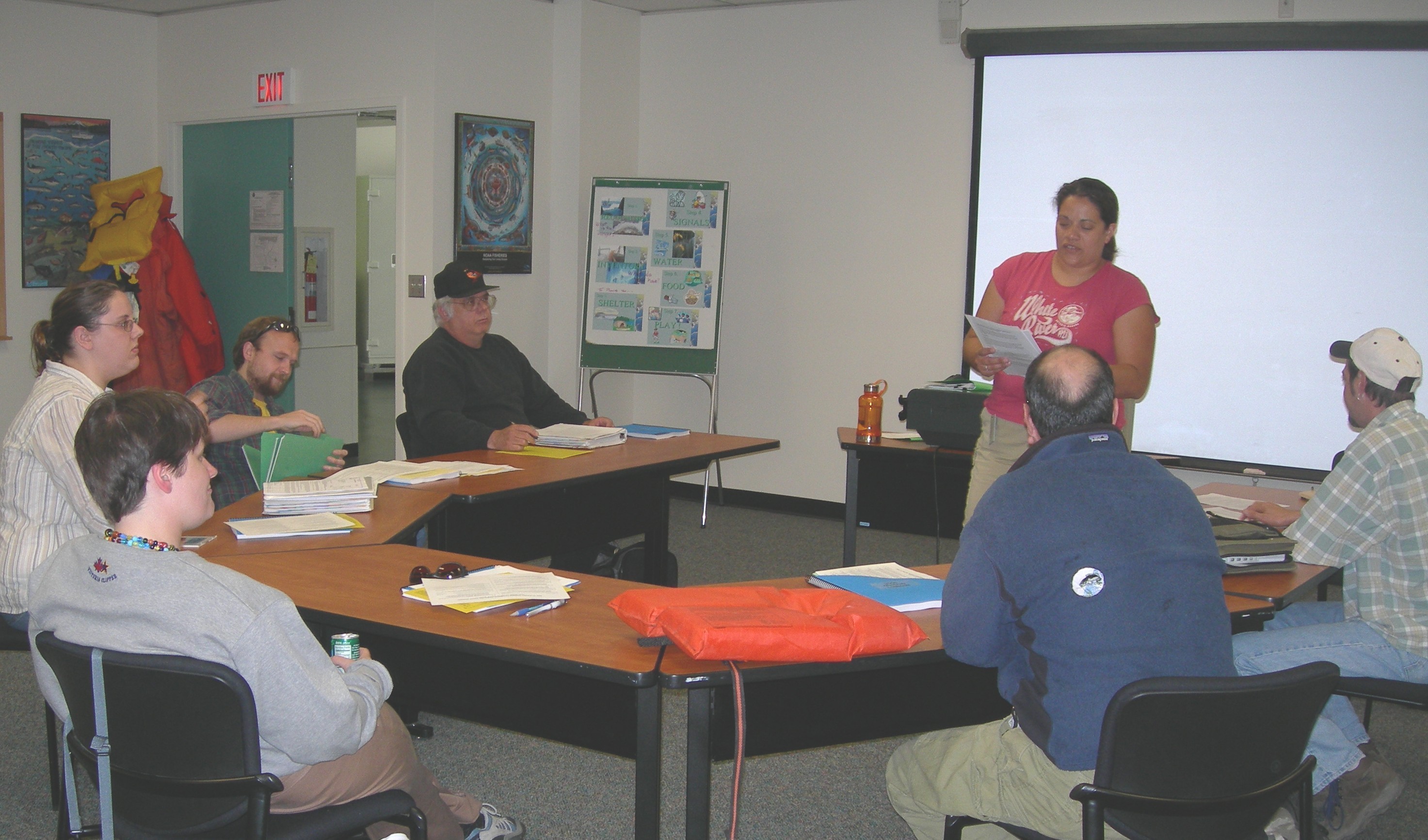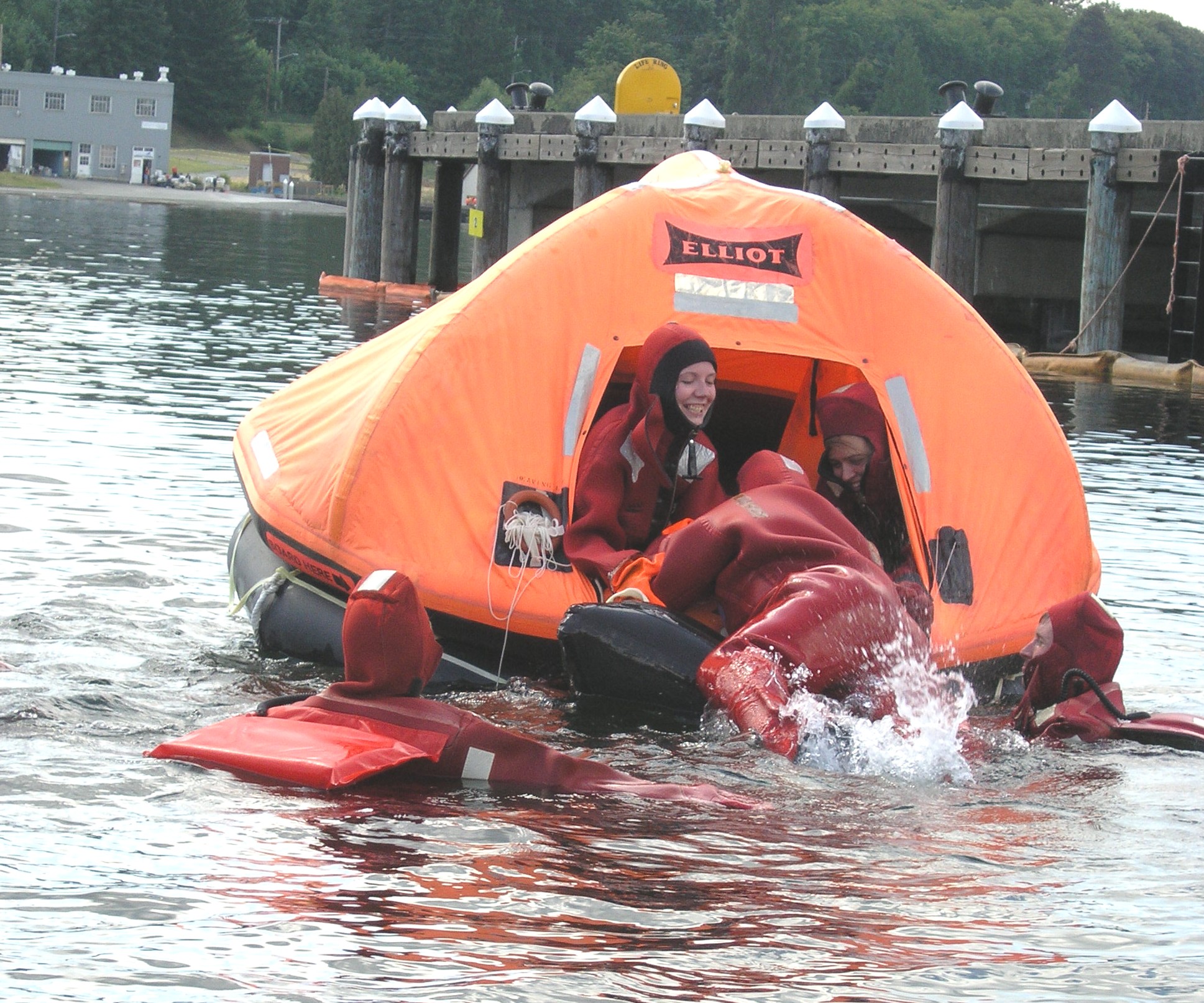|
Observer Training
 The observer training curriculum includes at-sea safety; sampling methods, techniques
and procedures; identification of invertebrates, fish, birds, and marine mammals
found in the Bering Sea of Alaska and Gulf of Alaska; data recording and reporting
requirements; electronic data entry and transmission; pertinent fishing regulations,
the basics of fisheries management, and life as an observer.
The observer training curriculum includes at-sea safety; sampling methods, techniques
and procedures; identification of invertebrates, fish, birds, and marine mammals
found in the Bering Sea of Alaska and Gulf of Alaska; data recording and reporting
requirements; electronic data entry and transmission; pertinent fishing regulations,
the basics of fisheries management, and life as an observer.
The training is time-consuming and intense as training staff attempt to mimic
work conditions observers encounter at sea as closely as possible. The
What is an Observer? brochure provides more information on the working conditions that observers typically encounter.
The job training uses written exercises and exams to assess each candidate's understanding of sampling methodologies, data recording and
submission protocols, and pertinent fishing regulations. Exams are also used to test trainees' ability to identify finfish, shellfish and
seabird species using dichotomous keys and field guides.
 To
obtain certification, observer candidates must attend the training course in
its entirety, fully participate during classroom exercises, and achieve minimum
performance standards as set by the FMA Division. In addition, trainees must
be able to lift up to 50 pounds, don an immersion suit on land in 60 seconds
or less, enter the water in an immersion suit, and climb into a floating life
raft. To
obtain certification, observer candidates must attend the training course in
its entirety, fully participate during classroom exercises, and achieve minimum
performance standards as set by the FMA Division. In addition, trainees must
be able to lift up to 50 pounds, don an immersion suit on land in 60 seconds
or less, enter the water in an immersion suit, and climb into a floating life
raft.
The FMA Division provides certified observers with sampling equipment and safety gear. Observers (or observer service providers) are responsible for providing sleeping bags, rain gear, boots, and gloves. Additional expenses to consider are room and board costs while in training, in transit, and awaiting deployment, and such costs as those associated with special clothing, supplies, and required medical examinations.
Members of the fishing community have expressed an interest in attending parts of the observer training class. We are able to make arrangements for this when notified in advance.
Briefing - Refresher Training for Experienced, Certified Observers
Observers who have successfully completed an observer cruise must attend refresher training called a "briefing," prior to each subsequent deployment. The type of briefing required is dependent on when the observer last deployed and/or the quality of their past performance. There are three briefing types available, varying in duration and material covered. Please see the training and briefing requirements and expiration rules for an explanation of when each briefing type is required.
The 4-Day Briefing
 Observer Services Program staff and guest lecturers cover topics which include: safety awareness, enforcement issues, random sampling techniques,
and changes in sampling protocol, regulations, and data forms. Time is allocated for review of species identification and observers must pass a species identification exam to successfully complete this briefing type. Observers are afforded the opportunity to ask questions and review with
staff any recommendations from previous evaluations.
Observer Services Program staff and guest lecturers cover topics which include: safety awareness, enforcement issues, random sampling techniques,
and changes in sampling protocol, regulations, and data forms. Time is allocated for review of species identification and observers must pass a species identification exam to successfully complete this briefing type. Observers are afforded the opportunity to ask questions and review with
staff any recommendations from previous evaluations.
- Every observer holding a current certification must attend one 4-day briefing prior to their first contract of the calendar year.
- Any observer who has demonstrated moderate conceptual issues and/or deficiencies pertaining to fish identification must attend a four day briefing, regardless of whether they have already attended a 4-day briefing within the calendar year.
The 2-Day Briefing
The 2-day briefing is provided for observers who need the benefit of a one-on-one tutorial with training staff. The 2-day tutorial material caters specifically to the observer(s) in attendance to ensure a comprehensive review of the material. The first day of the briefing focuses on remedying
any areas of deficiency while the second is spent attending the standard 1-day briefing with other returning observers.
The 1-Day Briefing
One day briefings are designed for observers in good standing who have no or few problems with sampling methods or species identification. The material reviewed includes: sampling priorities, avoiding common mistakes, and any changes in sampling protocol and/or regulations that occurred
since the observers' 4-day briefing. Observers are provided the opportunity to ask vessel and/or fishery specific questions.
|